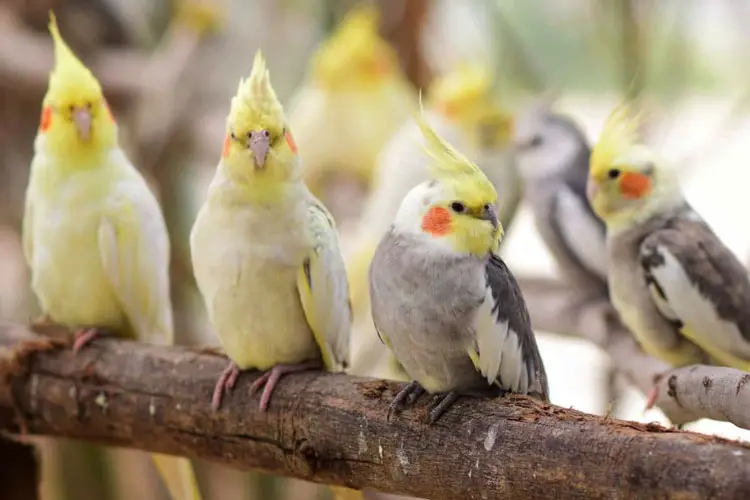If you’re thinking about getting a cockatiel or already have one, now is the time to learn everything you can about bird droppings. Although it may appear disgusting, examining your cockatiel’s poop may help keep your pet healthy. Why? Because a bird’s droppings are one of the best indicators of its health.
When examining cockatiel poop, you should consider its color, consistency, odor, and amount. Any unusualities such as watery poop or different color of poop indicates issues such as parasites, and kidney problems, among other reasons. The normal poop of a cockatiel is firm, solid, and odorless.
This article will take you through all you need about cockatiel poop and how it can help you determine your bird’s health condition.
Cockatiel Poop Chart
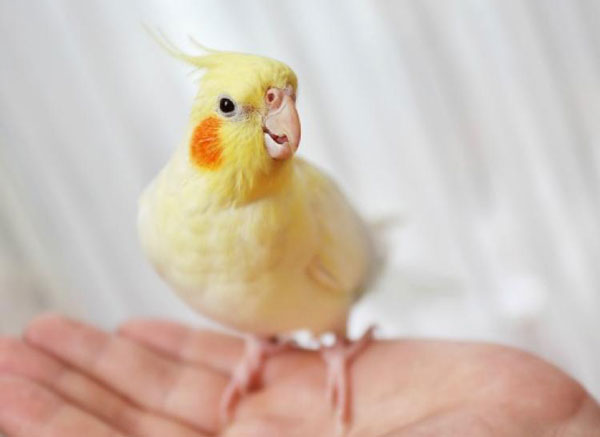
Here is a chart summarizing all there is to know about a cockatiel’s poop.
| Nature of poop | Health condition represented |
| White urates, clear urine, well-formed brown or green poop | Normal poop |
| Watery appearance | Diarrhea Polyuria |
| Black or fresh red blood | Digestive tract bleeding Intestinal infection Tumors Egg binding |
| Undigested food in droppings | Proventricular dilatation disease Poor digestion Parasites Intestinal disease |
| Thick, black-like texture | Digested blood in the stool (Melena) |
| Mustard feces | Liver disease |
| Lime-green or yellow feces | Your bird may not be eating Chlamydiosis |
| Slimy droppings | Yeast overgrowth |
| Foamy droppings | Bacteria infection e.g., Psittacosis Gas |
| Increased droppings | Egg laying Poor digestion |
| Urine and urate but no feces for several hours | Malnutrition |
| Tiny scant black droppings | Anorexia |
| Red or reddish-brown droppings | Heavy metal toxicity Internal bleeding Kidney issues |
| Yellow urates | Hepatitis |
| Brown urates | Lead poisoning |
| Sticky feces that contains blood | Roundworms |
| Droppings often have a popcorn-like appearance | Avian Giardiasis Pancreatic disease |
| Putrid-smelling | Avian Papillomatosis |
| Excessive urine | Kidney disease High diet of fruits and vegetables |
| Straining, decreased dropping, blood in droppings | Prolapsed cloaca. Blockage |
Examine the Cockatiel Poop to Determine Health Condition
Cockatiels, like all birds, excrete urine and feces simultaneously and from the same place.
Normal poop comprises three parts; stool/feces, urate/solid urine, and urine. The stool is green or brown and is usually a substantial component. The droppings’ color may vary depending on what the cockatiel has eaten.
The urate is the second component. Urate is a by-product of protein digestion removed by the kidney. It is whitish and made up of uric acid crystals. The third component is clear liquid urine. The bird has an underlying issue if you notice any urine color change.
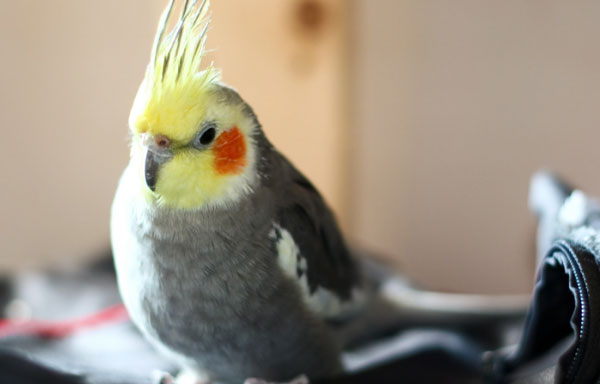
So let us deeply examine what any of the above alterations in the characteristics mentioned above could indicate.
Color
If the feces have changed without a change in diet or routine, there may be a problem. Remember that cockatiels do their best to conceal illness. Therefore, you should not ignore any changes in your cockatiel’s feces, as it is a sign of infection.
As mentioned, fecal color can vary with the cockatiel’s diet. The color of the food is generally reflected in the droppings. For example, cockatiels who feed on seed-based diets excrete green droppings, while those on a pellet diet excrete brown or tan droppings.
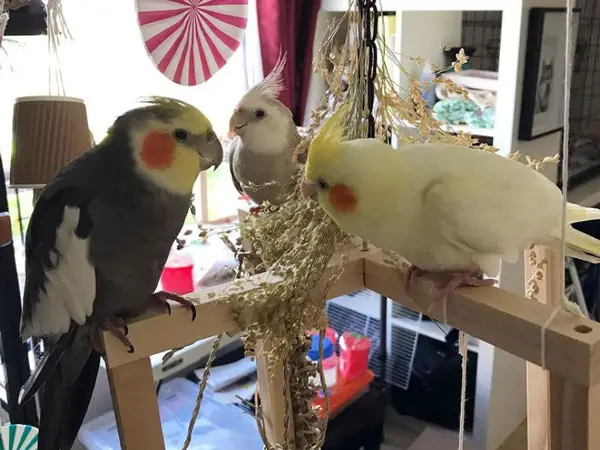
Carrots and baked sweet potatoes result in orange feces, and blueberries, cherries, and pomegranates result in dark red or purple feces. This is natural and not a problem. However, consult your avian veterinarian if you see any strange colors in the excrement. You can look at the above poop chart to identify different poop colors and their meaning.
Texture
Normal poop is usually firm and solid. So, if your cockatiel is excreting liquid stool, it could indicate kidney disease. If the poop is watery, it could be diarrhea. The nutrition of your cockatiel will also affect the texture of its feces.
Various factors, such as stress, introducing a new food too rapidly, consuming damaged or rotten food, illness, and an irritating environment, can also trigger diarrhea. A reasonable rule of thumb is that the poop should have a consistency similar to toothpaste. The droppings should be neither too wet nor too dry.
For example, if the feces are slimy and frothy or contain partially digested food, your cockatiel has an underlying issue. A yeast infection might result in slimy poop, while frothy feces may result from Clostridium.
You should consult a veterinarian immediately to have a laboratory evaluate a feces sample to identify whether a bacterial or fungal infection is present. Note that there is diarrhea and polyuria. Diarrhea looks like splattered pea soup. The feces are moist and sticky with an unpleasant odor and adhere to the cockatiel’s vent, making the vent and feathers beneath the vent filthy.
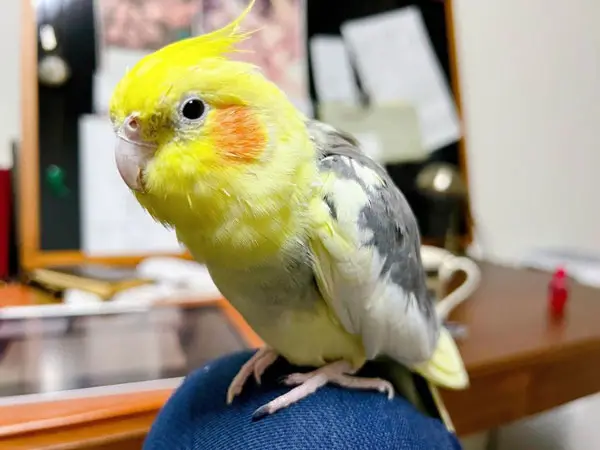
If your cockatiel has a dirty bum from diarrhea, ensure you clean it. Why? Because the feces can dry and block the vent. Use a warm, wet cloth. Diarrhea can cause dehydration, which is dangerous if not handled.
On the other hand, polyuria does not stick to the bird’s vent or feathers. It is caused by a diet containing a high amount of fruits and vegetables. It can also be a sign of diabetes, kidney disease, or an infection.
Polyuria also called watery feces, occurs when the cockatiel passes an excessive amount of pee, yet the feces remains firm. Use paper on the bottom of the cage, making feces identification easier. Change the paper daily.
Odor
Normal cockatiel droppings are odorless. This is because cockatiels rarely consume meat, so they do not break down animal protein in their systems, which causes mammals’ feces to stink. You might find it challenging to sniff the cockatiel’s poop, so try and eliminate anything in the cage that might be causing a smell—for example, leftover food or smelly water.
If there is still a smell in the cage, it is the droppings. A poop that smells strongly may indicate an infection, digestive difficulties, or another sort of sickness. Call your veterinarian to determine what the issue is.
Amount of the droppings
Fewer feces than usual can arise from decreased food intake or gastrointestinal ailment. Increased fecal content is regular in a female cockatiel that is gravid. The female cockatiel holds poop and only excretes when it leaves the nest.
If a cockatiel is not gravid and is passing out a lot of poop, it means that food is not getting absorbed properly in its body. So, could you take it to see a veterinarian? Here are other reasons why you should visit an avian veterinarian;
- Droppings remain abnormally wet with increased urine, as this can be due to kidney or liver disease or infection
- The cockatiel has a persistently wet cloacal area
- The fecal content remains low even if your bird has ample food available
Consistency
We have seen that normal cockatiel poop should contain a substantial quantity of liquid and a solid component. The consistency of the droppings will vary depending on the cockatiel’s diet. Fruit, vegetables, and other succulent foods will produce more watery droppings.
In addition to creating brownish droppings, pelleted diets may cause increased water consumption, resulting in more fluid droppings with a less formed fecal component and higher urination. Droppings with an abrupt change in consistency and color may suggest illness.
If the cockatiel is not feeding, it will urinate to pass only liquid urine and urate crystals and no fecal matter. If this happens, take the cockatiel to a vet as soon as possible.
How Frequently Should a Cockatiel Poop?
A cockatiel may poop 40 to 50 times each day on average. They may also do so after roughly 10 to 20 minutes. This might seem like a lot, but it is normal. Cockatiels have a fast metabolic rate and accelerated pace of food processing. Thus they excrete frequently.
Furthermore, cockatiels fly frequently, and their weight should be small to be efficient. As a result, pooping now and again makes it easier for them to fly and maintain a small weight. The number of times your pet cockatiel poops will vary according to size. Smaller cockatiels typically poop more regularly than larger ones.
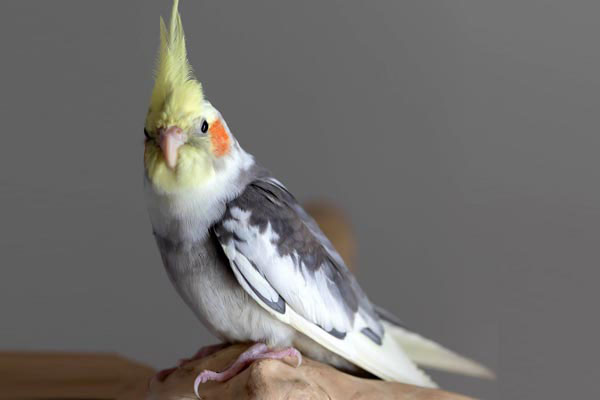
As a result, if you own a baby cockatiel, be prepared to perform more cleaning. In certain circumstances, the cockatiel may poop less frequently than usual. This can happen to female cockatiels that lay eggs.
The female cockatiel will poop at a slower rate, i.e., twice or thrice a day. This is because it retains the droppings for an extended period. If this is not the case, the pet bird poop frequently.
The good thing about cockatiel poop is that it does not stink. So, there is no problem if the cockatiel poops frequently. Yours will only be to clean the cage. Furthermore, if the cockatiel cannot poop, it may have a blockage in its gastrointestinal tract.
This may necessitate special attention. As a result, it is better if a cockatiel frequently poops than refrain from doing so. An increase in the frequency of cockatiel droppings may mean the cockatiel is suffering from an infection or other conditions, such as diarrhea or polyuria.
Also, a decrease in the frequency of cockatiel poop could indicate a blockage. Consult your avian veterinarian if you notice a large abdomen or slumped posture. Also, if the cockatiel strains when pooping, consider that an emergency.
What Causes Abnormal Droppings in Cockatiels?
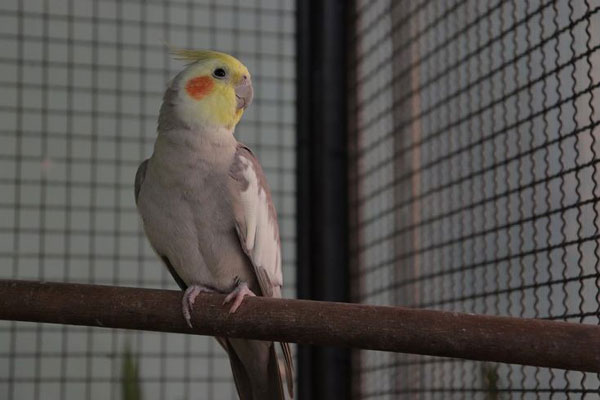
Here is a summary of anything that might cause abnormal poop in cockatiels;
- A change in diet may cause diarrhea and the color of the poop.
- The color of the diet may reflect in the poop.
- A lot of moist foods may result in polyuria(increased urine).
- Intestinal disease and bacterial and viral infections may result in diarrhea, polyuria, or a change in the color of the poop.
- Stress
- Liver or kidney diseases.
- Heavy metal consumption or eating rotten food.
FAQs
Here are other frequently asked questions.
Undigested food in the droppings implies a problem with the intestines or stomach. Infections (viral, bacterial, or fungal), diseases, and worms can also be to blame.
If you use paper at the bottom of the cage, ensure you remove it daily. As for cleaning the cage, do a thorough clean-up once a week. Ensure you remove all leftover food and wash the food and water bowl.
Scrub the cage’s bars, toys, and perches to eliminate any food stuck on them. Then, once the food and water bowl are dry, refill them with fresh food and water.
Outro
Observing a cockatiel’s feces might indicate whether the bird is sick or healthy. Now you know the difference between normal and abnormal feces. Abnormal feces are not necessarily indicative of sickness. However, you should contact your veterinarian promptly so that they may diagnose the problem and treat your cockatiel.
By committing to learning about your bird’s droppings, you will be able to detect indicators of certain illnesses sooner. That will enable you to offer your pet the care it needs to recover. We hope that you have learned enough regarding your cockatiels healthy poop from this content.
